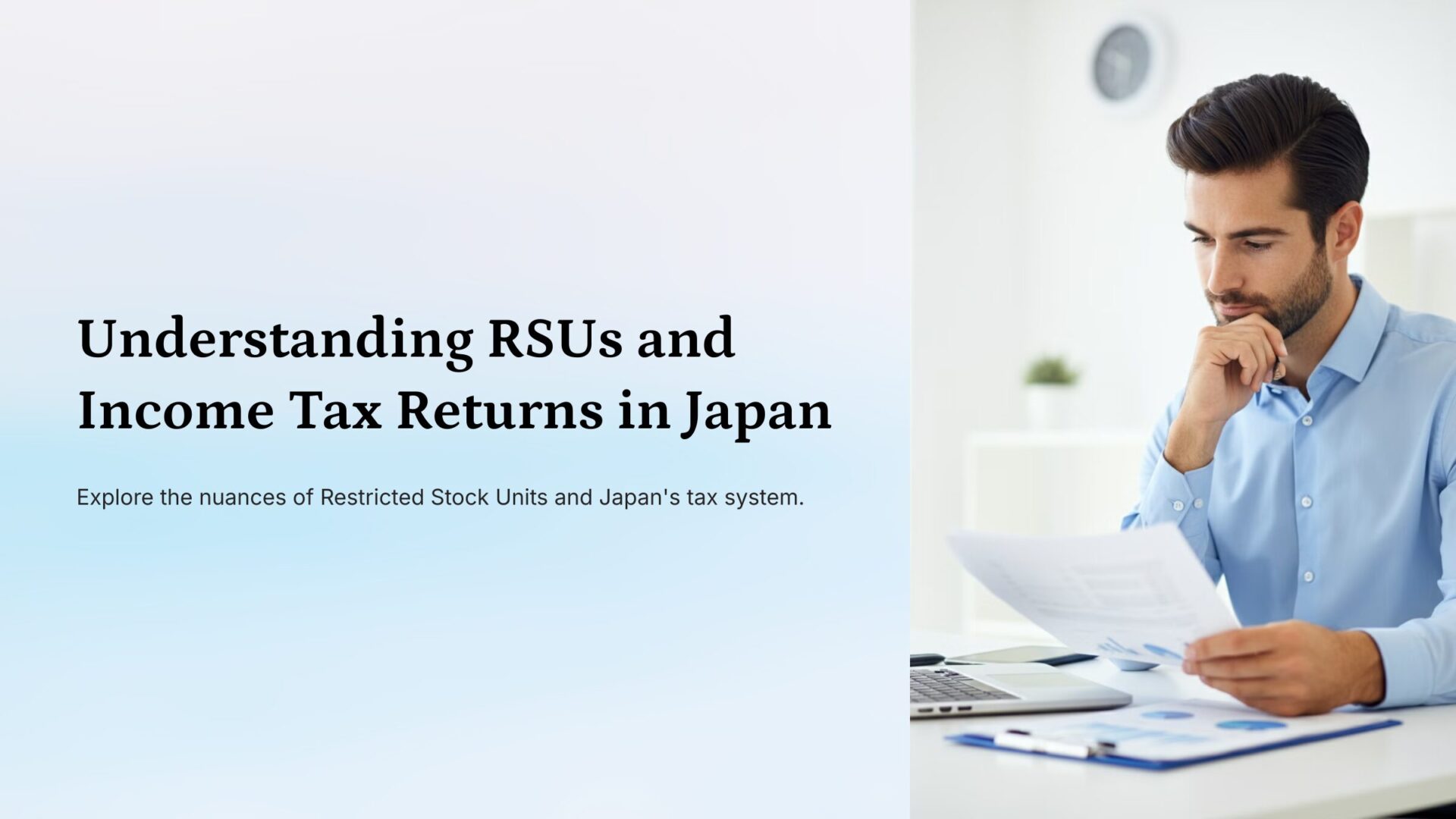In today’s globalized economy, many employees receive compensation as Restricted Stock Units (RSUs), which can significantly impact their tax obligations. Understanding how RSUs are treated under Japan’s tax system is crucial for individuals navigating their income tax returns. This guide will explore the nuances of RSUs, the overall taxation landscape in Japan, and the importance of comprehending these elements for tax purposes.
Introduction to RSUs and Taxation in Japan
Restricted Stock Units (RSUs) are a form of employee compensation that grants employees shares of stock after certain conditions are met, typically related to employment duration or performance. In Japan, RSUs are considered a type of restricted stock and are subject to specific tax treatment. When these units vest, they are taxed as salary income, leading to taxable income that must be reported on the individual’s income tax return. Understanding the implications of RSUs is fundamental for employees to accurately file their tax returns and manage their tax liability.
What are RSUs?
RSUs, or Restricted Stock Units, are a popular form of employee stock compensation that provide workers with the promise of future stock ownership. Unlike stock options, which grant the right to purchase shares at a predetermined price, RSUs convert into actual shares upon vesting. This transition can result in taxable income subject to Japan’s progressive tax rates. Employees must be aware that upon vesting, the value of RSUs is considered employment income, which can significantly affect their overall tax return in Japan. Notably, the taxation of RSUs typically occurs at the time of vesting, making it essential for employees to understand their tax obligations when they receive these units.
Overview of Tax in Japan
The tax system in Japan is characterized by a progressive tax structure, meaning that the tax rate increases with higher amounts of income. Individuals are subject to national tax and local tax, which together form the basis of their income tax obligations. Tax treatment of income can vary, with employment income, business income, and dividend income all falling under different categories within the Japanese tax law. Additionally, residents in Japan are taxed on their worldwide income, while non-residents are taxed only on income derived from Japan. Understanding these distinctions is vital for anyone filing an income tax return in Japan, particularly those with foreign income or investments.
Importance of Understanding RSUs and Income Tax
Understanding the implications of RSUs and their relation to income tax is crucial for employees, especially those working for multinational corporations. Many employees may not realize that the vesting of RSUs can lead to significant taxable income, thereby increasing their tax liability. Furthermore, the complexity of tax matters in Japan, including the need to file a tax return and the potential for foreign tax credits, highlights the importance of being informed. By grasping the tax treatment of RSUs, employees can optimize their tax returns, potentially benefiting from available tax credits and ensuring compliance with tax authorities. This knowledge is essential for effective personal financial planning and minimizing unexpected tax burdens.
Tax Implications of RSUs in Japan
Tax Treatment of Restricted Stock Units (RSUs)
The tax treatment of Restricted Stock Units (RSUs) in Japan is critical for employees to understand, as it directly influences their overall income tax liability. When RSUs vest, they are classified as taxable income, specifically taxed as salary income. This means that the value of the vested RSUs is subject to the progressive tax rates applicable to individual income tax in Japan. Furthermore, employees should be aware that the tax authorities require proper reporting of this income on the individual income tax return, which can significantly affect the total taxable income for the tax year.
Employment Income and RSUs
In Japan, employment income encompasses all compensation for services rendered, including Restricted Stock Units. Upon vesting, RSUs are treated as part of an employee’s salary income and contribute to the overall income subject to taxation. Employees must recognize that this additional income can push them into a higher tax bracket, increasing their effective tax rate. It is essential to accurately file a tax return and include all RSU-related income, as failing to report this could lead to complications with the tax authorities and potential penalties for underreporting income.
Capital Gains Tax on RSUs
Once RSUs have vested and converted into actual shares, any subsequent sale may lead to capital gains subject to a different taxation framework. In Japan, capital gains derived from the sale of shares are generally taxed under the capital gains tax regime. Employees should be aware that this tax applies to the profit made from the sale of the RSUs, calculated as the difference between the sale price and the acquisition cost. Understanding the implications of capital gains tax is vital for effective tax planning and ensuring compliance with Japanese tax law, especially for employees dealing with varying amounts of income derived from their RSUs.
Filing Your Income Tax Return in Japan
Understanding the Income Tax Return Process
Filing an income tax return in Japan involves understanding the specific requirements set forth by the tax authorities. The process typically begins with determining the taxable income from various sources, including salary, business, and any income derived from RSUs. Employees must gather documentation detailing their earnings and withholdings, which will be crucial in accurately reporting taxable income. The Japanese tax system operates on a progressive tax rate, meaning higher income levels incur higher rates. Therefore, proper income categorization is essential to minimize tax liability and ensure compliance with tax law.
Required Documentation for RSUs
When filing an individual income tax return, including the necessary documentation related to Restricted Stock Units (RSUs) is vital. This includes statements reflecting the vesting of RSUs, which will outline the value subject to taxation as salary income. Additionally, employees should maintain records of any post-vesting stock transactions, as these may result in capital gains that are subject to capital gains tax. Accurate documentation facilitates the filing process and serves as a safeguard in case of inquiries from tax authorities regarding the reported income and tax treatment of the RSUs.
Common Mistakes in Individual Income Tax Returns
Many individuals filing their income tax returns in Japan make common mistakes that can lead to complications with tax authorities. One prevalent error is the misreporting of RSU-related income, either by failing to include it or inaccurately calculating its value at vesting. Additionally, some may overlook the implications of capital gains tax when selling RSU shares, leading to underreporting of taxable income. It is crucial to double-check all figures and ensure compliance with tax regulations to avoid potential penalties and ensure that all eligible tax credits are claimed effectively during the tax year.
Income Types and Their Tax Treatment
Employment Income vs. Business Income
Understanding the distinction between employment and business income in Japan is vital for accurate income tax reporting. Employment income is derived from wages, salaries, and bonuses received by employees, including compensation from Restricted Stock Units (RSUs). Conversely, business income pertains to profits earned by self-employed individuals or businesses. Each type of income is subject to different tax treatments under the Japanese tax system. Employment income is taxed progressively, while business income may allow for various deductions, impacting overall tax liability. Therefore, individuals must categorize their income correctly to ensure compliance with tax laws and optimize their tax return in Japan.
Dividend Income and Taxation
Dividend income is another significant category that affects individuals’ taxable income in Japan. When shareholders receive corporate dividends, this income is generally subject to taxation under the national and local tax frameworks. The tax rate on dividend income can vary but is typically withheld at the source, simplifying the reporting process for taxpayers. However, individuals must recognize that dividends can be part of their overall income tax obligation and may be eligible for foreign tax credits if applicable. Understanding the implications of dividend income ensures that individuals accurately file a tax return and remain compliant with Japanese tax regulations.
Rental Income and Tax Considerations
Rental income is also subject to specific tax treatment in Japan, which can significantly impact an individual’s overall tax liability. Income from renting out property is taxable and must be reported on the individual’s income tax return. The Japanese tax law allows for certain deductions related to rental properties, such as maintenance costs and property taxes, which can reduce the taxable amount. Therefore, property owners should maintain thorough records of all income earned and expenses incurred to ensure compliance and optimize the tax credits available. Understanding these considerations is crucial for effective personal financial management and proper tax filing in Japan.
Conclusion and Best Practices
Key Takeaways on RSUs and Income Tax
In conclusion, navigating the complexities of RSUs and their tax implications in Japan requires a thorough understanding of the associated tax treatment. RSUs are taxed as salary income upon vesting, contributing to the overall taxable income that must be reported. Employees should be vigilant in documenting their RSU-related income to avoid potential penalties from the tax authorities. Additionally, awareness of capital gains tax on the sale of RSU shares is essential for comprehensive tax planning. By grasping these concepts, individuals can optimize their income tax returns and manage their tax liability effectively.
Future Considerations for Tax in Japan
Looking ahead, individuals in Japan must remain informed about potential changes in the tax landscape that could impact their tax obligations. As the government continues to address economic challenges and global tax standards, adjustments to tax rates and regulations may occur. Employees receiving RSUs or those with diverse income sources should stay updated on developments that could affect their taxation. Engaging with tax professionals and utilizing available resources will be essential for making informed decisions regarding income tax in Japan and ensuring compliance with evolving tax laws.
Resources for Further Information
Numerous resources are available for individuals seeking additional guidance on RSUs and income tax in Japan. The National Tax Agency of Japan provides comprehensive information on tax regulations, filing requirements, and available tax credits. Furthermore, tax advisory services and online platforms dedicated to tax matters can offer personalized advice tailored to specific situations. Engaging with these resources can enhance understanding and facilitate effective tax planning, ensuring that individuals can successfully navigate the complexities of the Japanese tax system.





